动词不定式的被动语态作定语和过去分词作定语
动词不定式可以作各种成分
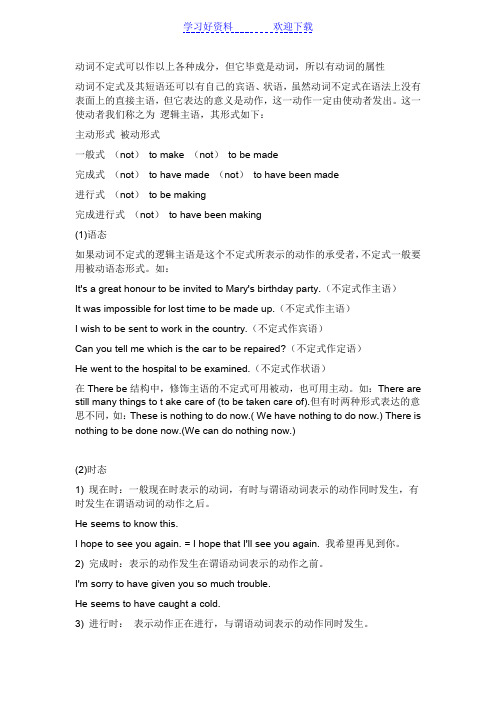
动词不定式可以作以上各种成分,但它毕竟是动词,所以有动词的属性动词不定式及其短语还可以有自己的宾语、状语,虽然动词不定式在语法上没有表面上的直接主语,但它表达的意义是动作,这一动作一定由使动者发出。
这一使动者我们称之为逻辑主语,其形式如下:主动形式被动形式一般式(not)to make (not)to be made完成式(not)to have made (not)to have been made进行式(not)to be making完成进行式(not)to have been making(1)语态如果动词不定式的逻辑主语是这个不定式所表示的动作的承受者,不定式一般要用被动语态形式。
如:It's a great honour to be invited to Mary's birthday party.(不定式作主语)It was impossible for lost time to be made up.(不定式作主语)I wish to be sent to work in the country.(不定式作宾语)Can you tell me which is the car to be repaired?(不定式作定语)He went to the hospital to be examined.(不定式作状语)在There be结构中,修饰主语的不定式可用被动,也可用主动。
如:There are still many things to t ake care of (to be taken care of).但有时两种形式表达的意思不同,如:These is nothing to do now.( We have nothing to do now.) There is nothing to be done now.(We can do nothing now.)(2)时态1) 现在时:一般现在时表示的动词,有时与谓语动词表示的动作同时发生,有时发生在谓语动词的动作之后。
【中考英语总复习 精讲精练】11 非谓语动词(解析版)

非谓语动词一、考点梳理考点一动词不定式动词不定式是动词的一种非限定形式,有带to 和省略to 两种形式,可以在句中作主语、表语、定语、宾语补足语、状语等成分。
1. 作主语To travel around China is my dream.环游中国是我的梦想。
注意:不定式作主语,整个结构看成一个整体,谓语动词用单数形式,但通常用it 作形式主语,而把不定式放于句末,来保持句子的平衡,常见的句式有:(1) It takes sb. some time to do sth.It took me twenty minutes to finish my English homework.完成我的英语家庭作业花费了我20分钟的时间。
(2) It’s + adj./n. + to do sth.It’s interesting to read the English books.读英语书是有趣的。
(3) It’s + adj. + for sb. + to do sth. 其中形容词是用来修饰动词不定式的。
It’s hard for me to learn English well.学好英语对我来说是困难的。
(4) It’s + adj. + of sb. + to do sth. 其中形容词是用来修饰人的。
It’s very kind of you to help me.你能帮助我真是太好了。
2. 作表语动词不定式作表语时,主要表示愿望、责任、义务等,一般可转化为动词不定式作主语。
His wish is to be a teacher.他的愿望就是当一名老师。
To be a policeman is his wish.当一名警察是他的愿望。
3. 作宾语decide, hope, plan, want, learn, seem, choose, fail 等后只能跟动词不定式作宾语。
I want to see a doctor about that cough.我想找医生治咳嗽。
语法专题突破(十一) 动词不定式

等。如:see,hear,notice,observe,listen to,smell,
feel;make,let,have,get,help等。
Who can persuade him to give up that foolish idea? 谁能劝他放弃那种愚蠢的想法? Someone saw a stranger walk into his room. 有人看见一个陌生人走进了他的房间。 The mother let the children wash their hands before eating meals.母亲让孩子们吃饭之前去洗手。
working at weekends.
A.Completing B.Having completed
He had no chance to go to school before liberation. 解放前他没有上学的机会。 Have you got anything to do this evening? 今晚你有事吗?
[注意] 不定式作定语时常与被它修饰的名词之间有动宾 关系。若不定式与该句的主语构成逻辑上的主谓关系,则
popular sport.
世界各地的人们都踢足球,这使它成了最受欢迎的运动。 (making...强调自然发展的结果)
(2010· 山东高考)I have a lot of readings ________ before
the end of this term.
A.completing C.completed B.to complete D.being completed
important one. 明天在会上将要讨论的问题非常重要。(表被动、将来) Have you read the novel written by Dickens? 你读过狄更斯的小说吗?(表被动、完成)
不定时作定语

1.动词不定式作定语后置表示要做的事(尚未发生),常与名词有动宾关系,不及物动词加介词。
2.现在分词作定语后置表示名词性质、特征或表示名词所做的动作(多表示进行、主动)。
现在分词作后置动词不定式作定语应注意:1. 表示将要发生的动作,有时根据句意需要加上介词,这时介词不能省略,因为被修饰的名词是它的宾语。
例The farmers thought of ways to protect their crops.We have only a small cold room to live in.2. 用于修饰被序数词、最高级或no, all, any等限定的中心词。
例Marie Curie became the first woman in France to be a university professor.She was the first person in the word to receive two Nobel Prize.He was the best man to do the job.3. 根据不同的句意,不定式可用主动语态或被动语态。
例Have you got anything to post? (post的动作执行者是“你”)Have you got anything to be posted?(post的动作执行者是“我”或“别人”)There are some plates to wash (to be washed).定语,表示与主句时态一致的一个经常发生的动作过去分词作后置定语,表示被动语态一、不定式作定语不定式作定语要放在它所修饰的名词之后,表示一个将来的动作,即不定式的动作发生在谓语之后。
多用来修饰have、there be、with之后的名词,表示“有…要…”或修饰“the+序数词”。
注意:不定式作定语,被修饰的词是不定式动作发生的时间、地点、工具或对象时,要加上适当的介词。
新高中英语人教版2019版教材各单元语法目录
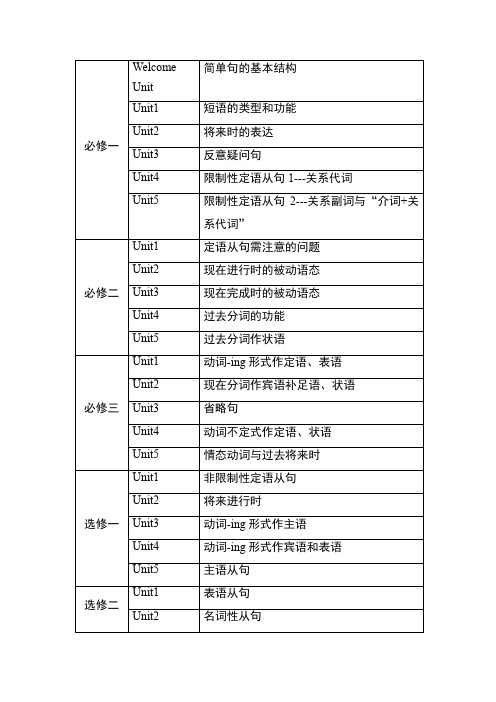
必修一Welcome Unit 简单句的基本结构一、句子成分二、基本句子结构必修一Unit 1 短语的类型和功能一、名词短语二、形容词短语三、副词短语必修一Unit 2 将来时的表达一、现在进行时的基本用法二、现在进行时表将来的用法三、其他几种表示将来的结构必修一Unit 3 反意疑问句附加疑问句一、否定附加疑问句的回答二、回答附加疑问句的原则三、附加疑问句的几种特殊情况必修一Unit 4 限制性定语从句1---关系代词一、关系代词的用法二、使用定语从句的注意事项必修一Unit 5 限制性定语从句2---关系副词与“介词+关系代词”一、关系副词引导的定语从句二、“介词+关系代词”引导的定语从句必修二Unit 1 定语从句需注意的问题限制性定语从句一、基本概念二、关系词的种类和功能三、that和which引导定语从句的区别必修二Unit 2 现在进行时的被动语态1.现在进行时的被动语态的构成形式2. 现在进行时的被动语态表示的意义3.现在进行时的被动语态注意要点必修二Unit 3 现在完成时的被动语态一、现在完成时的被动语态的常用句式二、现在完成时的被动语态的用法三、使用现在完成时的被动语态要注意6点问题必修二Unit 4 过去分词的功能一、过去分词作宾语补足语二、过去分词作定语必修二Unit 5 过去分词作状语一、过去分词作表语二、过去分词(短语)作状语必修三Unit 1 动词-ing形式作定语、表语一、动词ing形式作表语二、动词ing形式作定语必修三Unit 2 现在分词作宾语补足语、状语一、动词ing形式作状语二、动词ing形式作宾语补足语必修三Unit 3 省略句一、简单句中的省略二、并列句中的省略三、复合句中的省略四、其他的省略情况必修三Unit 4 动词不定式作定语、状语动词不定式一、结构二、用法必修三Unit 5 情态动词与过去将来时情态动词1.can/could的用法2.may/might的用法3.must/have to的用法4.shall/should的用法5.will/would的用法6.should/ought to的用法7.“情态动词+have done”的用法。
动词不定式作定语 不定式作后置定语
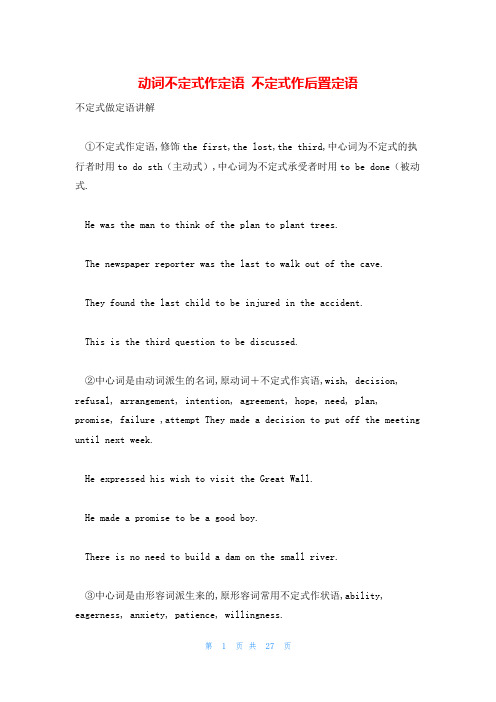
动词不定式作定语不定式作后置定语不定式做定语讲解①不定式作定语,修饰the first,the lost,the third,中心词为不定式的执行者时用to do sth(主动式),中心词为不定式承受者时用to be done(被动式.He was the man to think of the plan to plant trees.The newspaper reporter was the last to walk out of the cave.They found the last child to be injured in the accident.This is the third question to be discussed.②中心词是由动词派生的名词,原动词+不定式作宾语,wish, decision, refusal, arrangement, intention, agreement, hope, need, plan, promise, failure ,attempt They made a decision to put off the meeting until next week.He expressed his wish to visit the Great Wall.He made a promise to be a good boy.There is no need to build a dam on the small river.③中心词是由形容词派生来的,原形容词常用不定式作状语,ability, eagerness, anxiety, patience, willingness.A good teacher must have the ability to make himself understood.④名词本身是抽象名词,不定式解释其中的内容,chance,plan ,means , courage, efforts, measures, movement, opportunity, power, reason, right ,skill, strength, struggle, idea ,way 这时,不定式可以换成of + doing。
动词ing形式、过去分词和不定式的区别
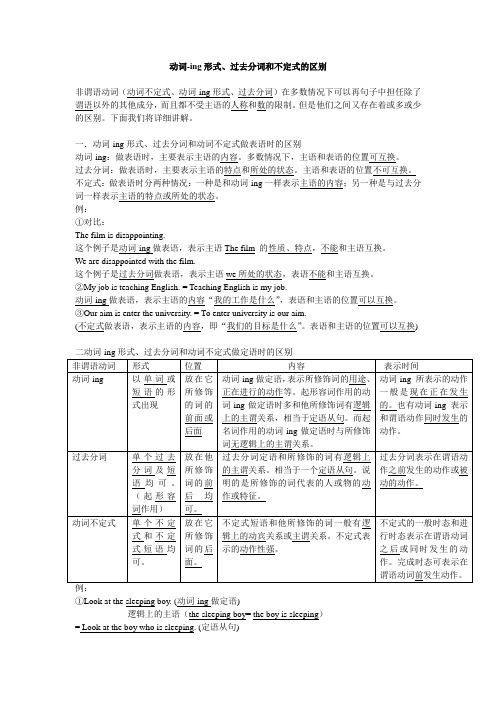
动词-ing形式、过去分词和不定式的区别非谓语动词(动词不定式、动词-ing形式、过去分词)在多数情况下可以再句子中担任除了谓语以外的其他成分,而且都不受主语的人称和数的限制。
但是他们之间又存在着或多或少的区别。
下面我们将详细讲解。
一.动词-ing形式、过去分词和动词不定式做表语时的区别动词-ing:做表语时,主要表示主语的内容。
多数情况下,主语和表语的位置可互换。
过去分词:做表语时,主要表示主语的特点和所处的状态。
主语和表语的位置不可互换。
不定式:做表语时分两种情况:一种是和动词-ing一样表示主语的内容;另一种是与过去分词一样表示主语的特点或所处的状态。
例:①对比:The film is disappointing.这个例子是动词-ing做表语,表示主语The film 的性质、特点,不能和主语互换。
We are disappointed with the film.这个例子是过去分词做表语,表示主语we所处的状态,表语不能和主语互换。
②My job is teaching English. = Teaching English is my job.动词-ing做表语,表示主语的内容“我的工作是什么”,表语和主语的位置可以互换。
③Our aim is enter the university. = To enter university is our aim.(不定式做表语,表示主语的内容,即“我们的目标是什么”。
表语和主语的位置可以互换)例:①Look at the sleeping boy. (动词-ing做定语)逻辑上的主语(the sleeping boy= the boy is sleeping)= Look at the boy who is sleeping. (定语从句)②Please go to the sleeping car. (动词-ing做定语)说明用途(the car is for sleeping)说明:动词-ing做定语Sleeping car : 1) 只有sleeping 重读2)不能变为定语从句3) 两者没有逻辑上的主谓关系③I have a lot of words to say. (不定式做定语)与words存在逻辑上的动宾关系(to say 是不定式的一般式,表示的动作和谓语动作同时发生)说明:不定式做定语words to say 1) to say 只能放在words后面。
动词的非谓语形式有三种
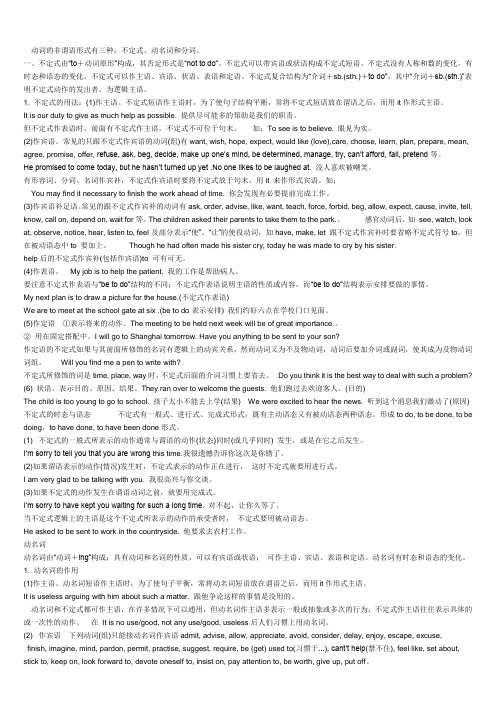
动词的非谓语形式有三种:不定式、动名词和分词。
一、不定式由“to+动词原形”构成,其否定形式是“not to do”。
不定式可以带宾语或状语构成不定式短语。
不定式没有人称和数的变化,有时态和语态的变化。
不定式可以作主语、宾语、状语、表语和定语。
不定式复合结构为“介词+sb.(sth.)+to do”,其中“介词+sb.(sth.)”表明不定式动作的发出者,为逻辑主语。
1. 不定式的用法:(1)作主语。
不定式短语作主语时,为了使句子结构平衡,常将不定式短语放在谓语之后,而用it作形式主语。
It is our duty to give as much help as possible. 提供尽可能多的帮助是我们的职责。
但不定式作表语时,前面有不定式作主语,不定式不可位于句末。
如:To see is to believe. 眼见为实。
(2)作宾语。
常见的只跟不定式作宾语的动词(组)有want, wish, hope, expect, would like (love),care, choose, learn, plan, prepare, mean, agree, promise, offer, refuse, ask, beg, decide, make up one’s mind, be determined, manage, try, can’t afford, fail, pretend等。
He promised to come today, but he hasn’t turned up yet .No one likes to be laughed at. 没人喜欢被嘲笑。
有形容词、分词、名词作宾补,不定式作宾语时要将不定式放于句末,用it 来作形式宾语。
如:You may find it necessary to finish the work ahead of time. 你会发现有必要提前完成工作。
动词不定式用法

动词不定式用法动词不定式在中学英语中应用非常广泛,一方面在句中可起名词、形容词或副词的作用,同时也可在句中作主语、宾语、定语、状语和宾语补足语。
动词不定式的形式一般是to +动词原形,但to有时要省去。
而动词不定式在具体运用时用不用to,取决于谓语动词的用法。
现就以下几方面介绍如下。
一、不定式结构1. 带to的不定式结构能直接跟带to的不定式结构的动词主要有:want, ask, tell, hope, learn, try, decide, forget, remember, like, love, stop, go, come等。
如:I want to go to the movies with you.我想跟你一起去看电影。
Don’t forget to turn off the light before you leave.在你离开之前别忘了关灯。
注意:动词不定式的否定形式是在不定式前直接加not,即not to do sth.。
如:Dave told me not to wake up Kate.大卫告诉我别叫醒凯特。
2. 不带to的不定式结构以下几种情况使用不带to的动词不定式:(1)在固定词组had better之后。
注意:had better的否定形式是had better not do sth.。
如:You had better go home now.你最好现在回家。
It’s cold outside. You’d better not go out.外面很冷,你最好不要出去。
(2)在let, make, see, feel, watch, hear等感官或使役动词后,要跟不带to的动词不定式作宾语补足语。
如:I made them give me the money back.我迫使他们把钱还给我。
I didn’t see you come in.我没看见你进来。
(3)在引导疑问句的why not之后。
语法复习——非谓语动词(二)
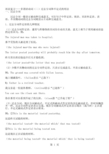
一、过去分词
过去分词一般表示被动和完成意义,可在句子中作定语、状语、宾语补足语、表语。不及物动词的过去分词则表示主动和完成意义。
1.过去分词作定语的几种情况
(1)过去分词作定语,通常与所修饰的名词存在动宾关系,意义上相当于使用被动语态的定语从句。例:
他走进屋后,后面跟着一些孩子。(表示伴随状态)
(相当于…, and he was followed by some children.)
5.怎样使用过去分词独立结构作状语
如果过去分词的逻辑主语与句子主语不一致,分词就须带上自己的逻辑主语。过去分词独立结构由“名(代)词+过去分词”构成。过去分词独立结构作状语,分词的逻辑主语是分词动作的承受者。过去分词独立结构可作时间、原因、条件、方式、伴随状语等。例:
The injured man was taken to hospital.
那个受伤的人被送到了医院。
(the injured man=the man who were injured)
The letter posted yesterday will probably reach him the day after tomorrow.
(相当于Because he was lost in thought, …)
(3)Given enough time, he could do it better.
如果给他充足的时间,他可以做得更好。(表示条件)
(相当于If he was given enough time,…)
(4)He went into the house, followed by some children.
动词不定式可以作以上各种成分
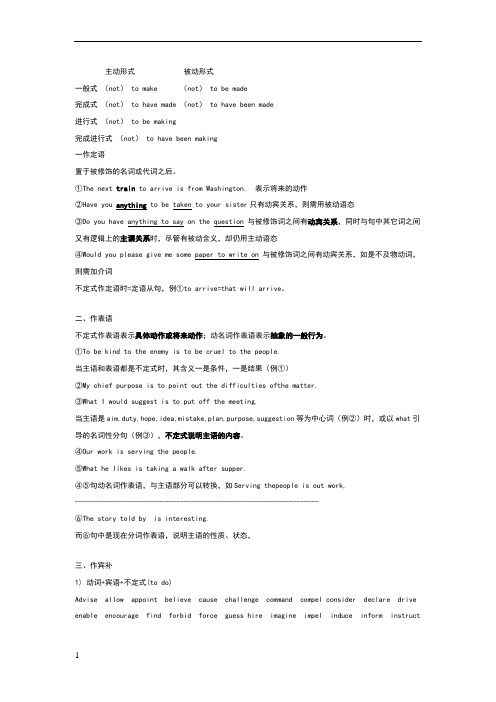
主动形式被动形式一般式(not) to make (not) to be made完成式(not) to have made (not) to have been made进行式(not) to be making完成进行式(not) to have been making一作定语置于被修饰的名词或代词之后。
①The next train to arrive is from Washington. 表示将来的动作②Have you anything to be taken to your sister只有动宾关系,则需用被动语态③Do you have anything to say on the question 与被修饰词之间有动宾关系,同时与句中其它词之间又有逻辑上的主谓关系时,尽管有被动含义,却仍用主动语态④Would you please give me some paper to write on 与被修饰词之间有动宾关系,如是不及物动词,则需加介词不定式作定语时=定语从句,例①to arrive=that will arrive。
二、作表语不定式作表语表示具体动作或将来动作;动名词作表语表示抽象的一般行为。
①To be kind to the enemy is to be cruel to the people.当主语和表语都是不定式时,其含义一是条件,一是结果(例①)②My chief purpose is to point out the difficulties ofthe matter.③What I would suggest is to put off the meeting.当主语是aim,duty,hope,idea,mistake,plan,purpose,suggestion等为中心词(例②)时,或以what引导的名词性分句(例③),不定式说明主语的内容。
④Our work is serving the people.⑤What he likes is taking a walk after supper.④⑤句动名词作表语,与主语部分可以转换,如Serving thepeople is out work,-----------------------------------------------------------------⑥The story told by is interesting.而⑥句中是现在分词作表语,说明主语的性质、状态,三、作宾补1) 动词+宾语+不定式(to do)Advise allow appoint believe cause challenge command compel consider declare drive enable encourage find forbid force guess hire imagine impel induce inform instructinvite judge know like order permit persuade remind report request require select send state suppose tell think train trust understand urge warnFather will not allow us to play on the street.父亲不让我们在街上玩耍I found him lying on the ground. 用分词做宾补(现在分词表达主动,也表达正在进行,过去分词表达被动)=I found it important to learn. 先加形式宾语,再加形容词,最后加带to do=I found that to learn English is important. 带一个从句此类动词还有get,have。
动词不定式的被动式

被动语态〔一〕语态是动词的一种形式,用以表示主语和谓语之间的关系。
英语的语态分为主动语态和被动语态。
主动语态表示主语是动作的执行者。
被动语态表示主语是动作的承受者。
★常用的几种时态的被动语态及含有情态动词的被动语态的构成形式★动词不定式的被动式【语境展示】观察下面各句中动词不定式的被动式的用法,然后加以总结。
1. It's nice to be wanted.2. The books are to be sent to the young children.3. She didn't like to be treated as a child.4. The question to be discussed at the next meeting will be a hard nut to crack.5. They were shipped to America to be sold as slaves.6. He didn't want the subject to be mentioned in the letter.7. Forty-one people are said to have been seriously hurt in the accident.【自我归纳】1. 当动词不定式与其逻辑主语之间是动宾关系时,要用不定式的被动式。
动词不定式的被动式有两种:①一般式的被动式:to be done〔句1-句6〕;②完成式的被动式:________〔句7〕。
2. 动词不定式的被动式在句中可以作主语〔句1〕、表语〔句2〕、宾语〔句3〕、________〔句4〕、状语〔句5〕、宾语补足语〔句6〕、主语补足语〔句7〕。
【自我归纳】to have been done;定语【即学即练】I. 用括号内动词的正确形式填空。
1. We’re having a meeting this afternoon. The decision ________ (make) at the meeting will influence the future of our company.2. Having a trip abroad is certainly good for the old couple, but it remains ________ (see) whether they will enjoy it.3. My friend didn’t want the subject ________ (mention) in the letter.4. The machine doesn’t work. It seems ________ (damage).5. The news reporters hurried to the airport, only ________ (tell) the film star had left. II. 用括号内动词的正确形式完成下面短文。
不定式的用法和动词不定式的时态
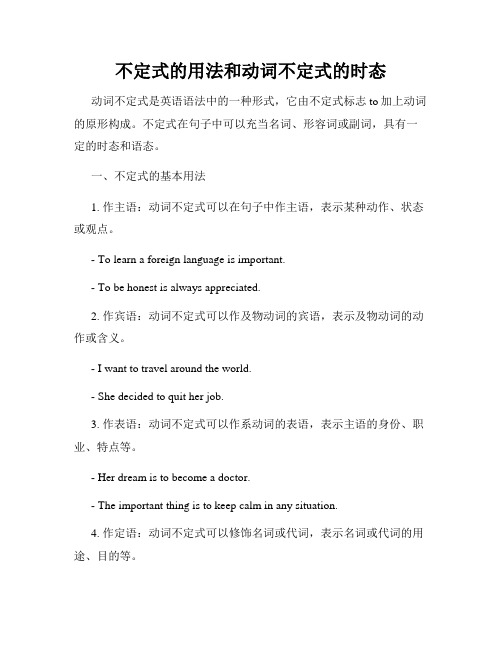
不定式的用法和动词不定式的时态动词不定式是英语语法中的一种形式,它由不定式标志to加上动词的原形构成。
不定式在句子中可以充当名词、形容词或副词,具有一定的时态和语态。
一、不定式的基本用法1. 作主语:动词不定式可以在句子中作主语,表示某种动作、状态或观点。
- To learn a foreign language is important.- To be honest is always appreciated.2. 作宾语:动词不定式可以作及物动词的宾语,表示及物动词的动作或含义。
- I want to travel around the world.- She decided to quit her job.3. 作表语:动词不定式可以作系动词的表语,表示主语的身份、职业、特点等。
- Her dream is to become a doctor.- The important thing is to keep calm in any situation.4. 作定语:动词不定式可以修饰名词或代词,表示名词或代词的用途、目的等。
- I have a book to read.- We have a meeting to attend tomorrow.5. 作状语:动词不定式可以在句中作状语,表示目的、原因、结果、时间等。
- He exercises every day to stay healthy. (目的)- She cried so hard as to lose her voice. (结果)二、动词不定式的时态动词不定式有两种时态:一般时和完成时。
1. 一般时不定式:使用动词的原形表示不定式的一般时态。
- I hope to visit my grandparents next week.- She likes to read books in her free time.2. 完成时不定式:使用动词的完成时形式,由“to have + 动词的过去分词”构成。
【备战高考】英语非谓语动词用法总结(完整)
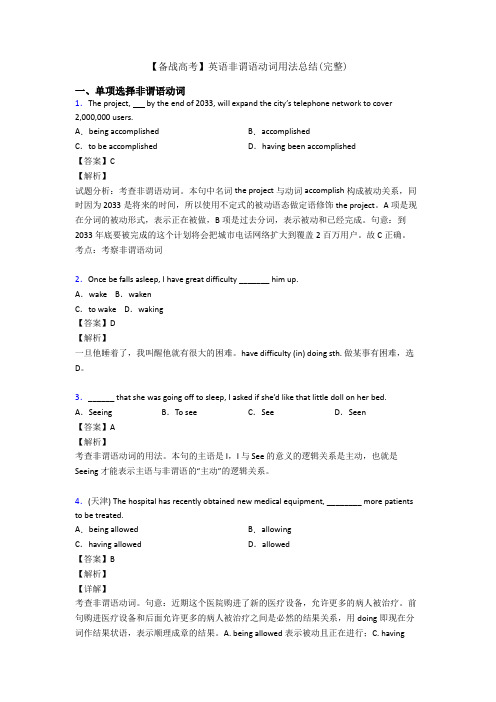
【备战高考】英语非谓语动词用法总结(完整)一、单项选择非谓语动词1.The project, by the end of 2033, will expand the city’s telephone network to cover2,000,000 users.A.being accomplished B.accomplishedC.to be accomplished D.having been accomplished【答案】C【解析】试题分析:考查非谓语动词。
本句中名词the project与动词accomplish构成被动关系,同时因为2033是将来的时间,所以使用不定式的被动语态做定语修饰the project。
A项是现在分词的被动形式,表示正在被做,B项是过去分词,表示被动和已经完成。
句意:到2033年底要被完成的这个计划将会把城市电话网络扩大到覆盖2百万用户。
故C正确。
考点:考察非谓语动词2.Once be falls asleep, I have great difficulty _______ him up.A.wake B.wakenC.to wake D.waking【答案】D【解析】一旦他睡着了,我叫醒他就有很大的困难。
have difficulty (in) doing sth. 做某事有困难,选D。
3.______ that she was going off to sleep, I asked if she’d like that little doll on her bed. A.Seeing B.To see C.See D.Seen【答案】A【解析】考查非谓语动词的用法。
本句的主语是 I,I 与 See 的意义的逻辑关系是主动,也就是Seeing 才能表示主语与非谓语的“主动”的逻辑关系。
4.(天津) The hospital has recently obtained new medical equipment, ________ more patients to be treated.A.being allowed B.allowingC.having allowed D.allowed【答案】B【解析】【详解】考查非谓语动词。
理解并运用动词不定式的完成被动形式

理解并运用动词不定式的完成被动形式动词不定式是一种常见的动词形式,在句子中可以作为主语、宾语、表语等。
而不定式的被动形式则是指在句中以被动的形式出现的动词不定式。
本文将探讨动词不定式的完成被动形式,引出其在句子中的使用方法及意义。
一、动词不定式的完成被动形式概述动词不定式的完成被动形式构成如下:to have been + 过去分词动词不定式的完成被动形式主要用于表示动作或状态发生在不定式动词之前。
它可以用于表达被动语态,强调动作的完成以及时间的先后关系等。
二、动词不定式的完成被动形式的句子结构1. 主动句变被动句主动句:She promised to finish the task.被动句:She promised to have been finished the task.2. 下列动词常用动词不定式的完成被动形式agree, decide, expect, hope, learn, need, plan, promise, want, etc.三、动词不定式的完成被动形式的使用方法1. 作为主语动词不定式的完成被动形式可以作为句子的主语,用来强调动作的完成以及时间的先后顺序。
例句:To have been invited to the wedding is a great honor.2. 作为宾语动词不定式的完成被动形式可以作为及物动词的宾语,表示动作的完成。
例句:I hope to have been promoted by the end of this year.3. 作为表语动词不定式的完成被动形式可以作为系动词的表语,用来补充和描述主语的状态。
例句:His dream is to have been recognized as a famous singer.4. 作为定语动词不定式的完成被动形式可以用作名词的定语,修饰名词。
例句:He is a man to have been trusted.5. 作为状语动词不定式的完成被动形式可以作为状语,表示原因、目的、结果等。
动词不定式的被动语态作定语和过去分词作定语
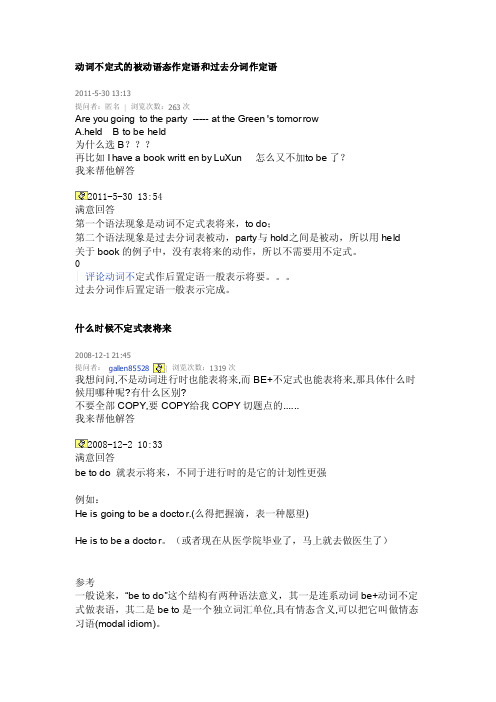
动词不定式的被动语态作定语和过去分词作定语2011-5-30 13:13提问者:匿名|浏览次数:263次Are you goingto the party----- at the Green's tomorr owA.held B to be held为什么选B???再比如I have a book writte n by LuXun怎么又不加t o be了?我来帮他解答2011-5-30 13:54满意回答第一个语法现象是动词不定式表将来,to do;第二个语法现象是过去分词表被动,party与hold之间是被动,所以用hel d关于book的例子中,没有表将来的动作,所以不需要用不定式。
|评论动词不定式作后置定语一般表示将要。
过去分词作后置定语一般表示完成。
什么时候不定式表将来2008-12-1 21:45提问者:gallen85528|浏览次数:1319次我想问问,不是动词进行时也能表将来,而BE+不定式也能表将来,那具体什么时候用哪种呢?有什么区别?不要全部CO PY,要COPY给我COPY切题点的......我来帮他解答2008-12-2 10:33满意回答be to do 就表示将来,不同于进行时的是它的计划性更强例如:He is goingto be a doctor.(么得把握滴,表一种愿望)He is to be a doctor。
(或者现在从医学院毕业了,马上就去做医生了)参考一般说来,“betodo”这个结构有两种语法意义,其一是连系动词be+动词不定式做表语,其二是beto是一个独立词汇单位,具有情态含义,可以把它叫做情态习语(modalidiom)。
一、be +动词不定式,不定式做表语,表示主语和表语在概念上是等同的。
高考英语 语法系列之过去分词不定式知识点分析

英语语法系列之过去分词【知识梳理】1. 定义:动词的-ed分词即过去分词,是由动词的过去分词构成,一般只有一种形式。
2. 过去分词的语法作用:过去分词一方面具有动词的性质,另一方面也相当于一个形容词或副词,在句中可以作表语、定语、状语和补足语。
1) 过去分词作表语,主要表示主语的心理感觉或所处的状态。
如:Don’t touch the glass because it is broken.不要碰那个杯子,它是坏的。
He is quite pleased with the design of the dress. 她很喜欢那礼服的式样。
2) 过去分词做定语:单个的过去分词作定语一般放在名词的前面,相当于一个定语从句。
如:The excited people rushed into the building. 激动的人们奔进了大楼。
过去分词短语作定语通常放在被修饰的词后面,相当于一个定语从句。
Is there anything planned for tomorrow? 明天有什么活动吗?过去分词作定语也可用作非限制性定语,前后用逗号隔开。
如:The meeting, attended by one thousand students, was a success.这次会议获得很大的成功,共有一千个学生出席了。
3) 过去分词做状语:过去分词和-ing分词作状语一样,也可以表示时间、原因、条件、让步、方式或伴随情况等。
①表时间,相当于一个时间状语从句,有时过去分词前可加连词when或while来强调时间概念。
如:Seen from the top of the hill, the city looked like a big garden. 从山顶上看,这个城市就像一个大花园。
②表原因,相当于一个原因状语从句。
如:Deeply moved by the story, the excited people stopped quarrelling with each other. 激动的人们被那个故事深深地感动了,停止了争吵。
动词不定式被动语态讲解

Book7 unit2 动词不定式被动语态形一、复各样的被★被的基本构 : be+ done(以 the book , publish 例)一般在 / 去:The book is/ was published .一般 / 去未来 :The book will/would be published .The book is/was going to be published .在 / 去行:The book is/was being published .在 / 去达成 :The book has/had been published .情:The book can/could/may/might ⋯ be published .二、不定式的被式的基知:语态时态主动语态被动语态一般式to do to be done达成式to have doneto havebeen done进行式to be doing没有被动语态达成进行式to have been doing没有被动语态1)一般式:( not/never)to be done2)达成式:( not/ never ) to have been done (表示不定式作生在以前)三、▲平常在 believe, suppose, say, report 等组成的句子中能够行主到被以及被和不定式的 .如 : They say that Mike is sick in bed.=It is said that Mike is sick in bed.=Mike is said to be sick in bed.据麦克卧床不起 .People believe that he was killed.=It is believed that he was killed.=He is believed to have been killed.大家相信他被了 .四、当不定式的主是不定式所表示的作的蒙受者而非出者,不定式一般要采纳被形式 (to be done).法功能:1.作主:It is an honour for me to be asked to speak here.2.作:She askedto be sent to work in Xinjiang.3.组成复合:He wanted the letter to be typed at once.She didn ’ t like herselftobe praised like that.4.组成复合谓语:The books are not allowed to be taken out of the room .5.作定语:Are you going to the meeting to be held in the teachers ’ office6.作状语:She was too youngto be assigned such work.五、不定式有时还能够有达成式的被动式 to have been done(表示该动作是发生在主句以前的一个被动动作),在句中作主语、宾语、定语,或许组成复合宾语、复合谓语等,如:It is a good thing for him to have been criticized.(主语)She preferred to have been given heavier work to do. (宾语 ))He thought it an honour to have been invited to the party. (复合宾语)The book is saidto have been translated into many languages. (复合谓语)She was the first woman to have been elected to such a post. (定语)六、不定式的主动形式表示被动1.There be 构造中,用不定式的主动和被动式来修饰主语,差别不大。
被动语态 和过去分词做定语
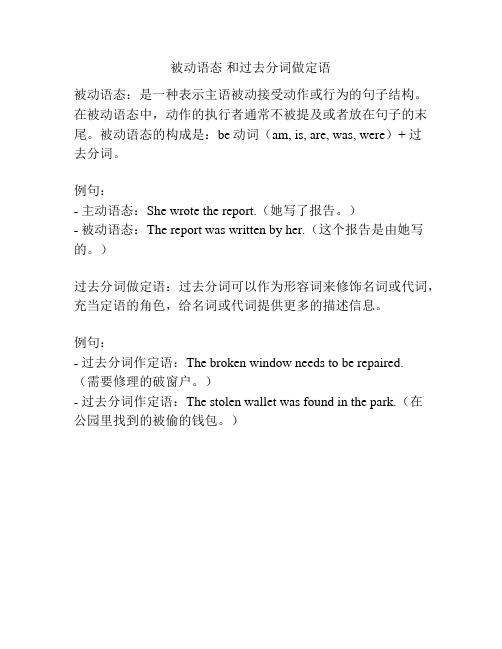
被动语态和过去分词做定语
被动语态:是一种表示主语被动接受动作或行为的句子结构。
在被动语态中,动作的执行者通常不被提及或者放在句子的末尾。
被动语态的构成是:be动词(am, is, are, was, were)+ 过
去分词。
例句:
- 主动语态:She wrote the report.(她写了报告。
)
- 被动语态:The report was written by her.(这个报告是由她写的。
)
过去分词做定语:过去分词可以作为形容词来修饰名词或代词,充当定语的角色,给名词或代词提供更多的描述信息。
例句:
- 过去分词作定语:The broken window needs to be repaired.
(需要修理的破窗户。
)
- 过去分词作定语:The stolen wallet was found in the park.(在
公园里找到的被偷的钱包。
)。
- 1、下载文档前请自行甄别文档内容的完整性,平台不提供额外的编辑、内容补充、找答案等附加服务。
- 2、"仅部分预览"的文档,不可在线预览部分如存在完整性等问题,可反馈申请退款(可完整预览的文档不适用该条件!)。
- 3、如文档侵犯您的权益,请联系客服反馈,我们会尽快为您处理(人工客服工作时间:9:00-18:30)。
动词不定式的被动语态作定语和过去分词作定语
2011-5-30 13:13
提问者:匿名|浏览次数:263次
Are you going to the party ----- at the Green's tomorrow
A.held B to be held
为什么选B???
再比如I have a book written by LuXun 怎么又不加to be了?
我来帮他解答
2011-5-30 13:54
满意回答
第一个语法现象是动词不定式表将来,to do;
第二个语法现象是过去分词表被动,party与hold之间是被动,所以用held 关于book的例子中,没有表将来的动作,所以不需要用不定式。
|评论动词不定式作后置定语一般表示将要。
过去分词作后置定语一般表示完成。
什么时候不定式表将来
2008-12-1 21:45
提问者:gallen85528|浏览次数:1319次
我想问问,不是动词进行时也能表将来,而BE+不定式也能表将来,那具体什么时候用哪种呢?有什么区别?
不要全部COPY,要COPY给我COPY切题点的......
我来帮他解答
2008-12-2 10:33
满意回答
be to do 就表示将来,不同于进行时的是它的计划性更强
例如:
He is going to be a doctor.(么得把握滴,表一种愿望)
He is to be a doctor。
(或者现在从医学院毕业了,马上就去做医生了)
参考
一般说来,“be to do”这个结构有两种语法意义,其一是连系动词be+动词不定式做表语,其二是be to是一个独立词汇单位,具有情态含义,可以把它叫做情态习语(modal idiom)。
一、be +动词不定式,不定式做表语,表示主语和表语在概念上是等同的。
如:
The problem is to find a solution.
His plan is to clean the room.
My wish is to be a doctor.
二、be to +动词不定式中的be to用作情态习语,这时的be to do表示: “计划”、“安排”、“义务”、“应该”、“可能”、“命运”等。
(have to, ought to)。
如:
He is to have a holiday. (表示将来)
The committee is to meet today. (表示计划、安排)
You are to go to the hotel where rooms have already been booked for you. 1.表示“将”、“计划”、“安排”。
(意思接近于be going to)如:
Their daughter is to get married soon.
Who is to question him?
It was the last film at the cinema,which was to close next day.
After dinner they were to go to a movie.
was/ were to do表示过去曾经计划要做的事,或者过去应当做的事,而且从现在的角度来看已经实现了。
如:
I felt nervous because I was soon to leave home for the first time.
I was to play Juliet.
The expedition was to start in a week’s time.
was/ were to have done,表示“本打算”、“本计划”或“本应当”做的事而没有做成或没有发生。
如:
I was to have seen him last Wednesday, but he didn’t come.
We were to have been married last year.
2.表示“义务”、“应该” 。
(意思接近于should,must,ought to,have to)如:
No one is to leave the building.谁也不得离开这楼房。
You are not to smoke in this room.=You are not supposed to smoke in this room.
You are to be back by 10 o’clock.你必须十点以前回来。
3.表示可能性,相当于can, may如:
Such books are to be found in the library.这样的书在图书馆里就能找到。
Not a single sound was to be heard.一点儿声音也听不到。
Not a soul was to be seen.看不到一个人影。
She was nowhere to be found.哪儿也找不到她。
She was never to see his wife and family again.
5.表示“命运”,将来必然要发生的事,译作“注定……”。
如:
He came to power, but he was to play dearly for it: soon he was assassinated.
The worst is still to come.
They said goodbye, little knowing they were never to meet again.
6.用于“if…were to do”,表示虚拟语气。
如:
If it were to rain tomorrow, the sports meeting would be put off.如果明天下雨,
运动会就会延期。
